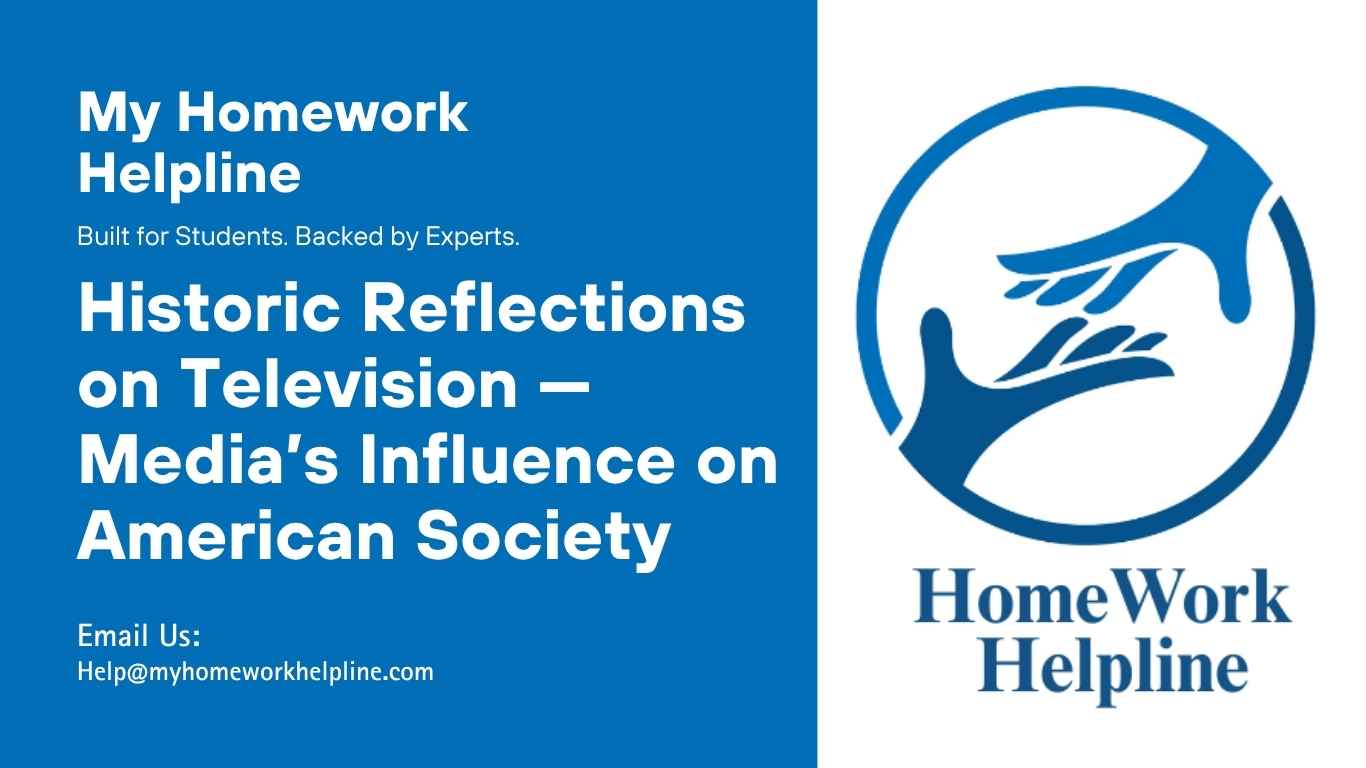Historic Reflections on Television — An Analytical Essay on Media Influence in American Society
Television is instrumental to Americans’ lives. Research has shown that television competes with other sources of human interaction, including friends, family, school, and church, in helping young people develop ideas and values about the world around them (Kellner, 2018). Television also influences people’s beliefs and attitudes about themselves and people from other cultural, ethnic, and social backgrounds. Television is also a reflection of our current social, political, and economic conditions. For instance, the television program ‘The Flintstones’ reflects American family life. However, currently ‘The Simpsons’ is (Akmaliah, 2020). This paper will explore different points in American history that depict how America is both a reflection of our current conditions and an influence on our thoughts and opinions.
Struggling with your English literature essay or cultural analysis paper? Get professional writing help from our English literature homework helpline for top-quality assignment and essay assistance. Our academic experts specialize in analytical writing, helping you craft well-structured papers that explore themes, media, and literary concepts with depth and precision. Whether it’s a television analysis or a novel study, we’ll help you excel in your coursework and boost your grades.
Televisions changed people’s minds during the Civil Rights Movement. The Civil Rights Movement was a struggle for equality and justice for Black people in America in the 1950s and 1960s. According to Kawa (2018), broadcasting of the US Supreme Court case, Brown vs. the Board of Education, in addition to the wide coverage of Emmett Till’s murder, became instrumental in instigating early discontent and anger with social norms in the south. Thus, the media influenced African Americans to threaten economic and political pressure for a fair trial. During the same period, there were very few minorities on television since the content was centered on entertaining Caucasian viewers (Kawa, 2018). Therefore, from the television, one could notice how minorities were segregated and oppressed in real life. It was during the civil rights movement that more minorities began appearing on TV, such as Bill Cosby.
Television also impacted the Vietnam War. The Vietnam War took place after World War II, after the US entered Vietnam in an attempt to prevent the spread of communism. According to Ernst et al. (2019), broadcasting the war distorted the public’s perception of the events that were taking place in Vietnam. Americans saw military abuses on television, resulting in riots across the nation, with the outrage resulting in the end of the US involvement in the war. Thus, television influences Americans’ ideas and opinions concerning war. Broadcasting the war also reflected how Americans are divided politically (Vaughan, 2020). Americans stood on different sides of the war, hence a divided nation.
Television also influenced Americans after the 9/11 attack. The September 11th attacks took place in 2001, which were four coordinated terrorist attacks carried out by a militant Islamic extremist network referred to as al-Qaeda (Mitnik et al., 2020). According to Kellner (2018), televising the event unifies Americans in patriotism and sadness. That resulted in public support for the war against the terrorist group. However, the broadcast also reflected a nation covered in racism. This is because the media profiled people with Islamic origins, government officials, and the public for being terrorists.
In conclusion, television influences how people think about social issues such as class, gender, and race. Television has played an essential role in American politics, including the Civil Rights Movement and the War in Vietnam. Therefore, it influenced the outcome of various historical events as the spread of information influences decision-making. Television is also a mirror of society as it has shown how the American people are divided on various issues, such as equal rights for all races, the war in Vietnam, and the freedom of all races to live in the US.
References
Akmaliah, W. (2020). The demise of moderate Islam: new media, contestation, and reclaiming religious authorities. Indonesian Journal of Islam and Muslim Societies, 10(1), 1-24.
Ernst, N., Esser, F., Blassnig, S., & Engesser, S. (2019). Favorable opportunity structures for populist communication: Comparing different types of politicians and issues in social media, television and the press. The International Journal of Press/Politics, 24(2), 165-188.
Kawa, K. (2018). Television: The Small Box that Changed the World. Greenhaven Publishing LLC.
Kellner, D. (2018). Television and the Crisis of Democracy. Routledge.
Mitnik, Z. S., Freilich, J. D., & Chermak, S. M. (2020). Post-9/11 coverage of terrorism in the New York Times. Justice Quarterly, 37(1), 161-185.
Vaughan, B. J. (2020). War, Media, and Memory: American Television News Coverage of the Vietnam War. Bridges: An Undergraduate Journal of Contemporary Connections, 4(1), 5.

